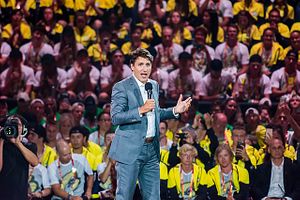Canadian Prime Minister Justin Trudeau wrapped up his five-day official visit to China on December 7. Although both the Chinese and Canadian governments believed that Trudeau’s China trip was successful, multiple media outlets mocked Trudeau for “returning home empty handed” without opening free trade talks with China.
However, his current “failure” to launch free trade talks with China has indeed fully demonstrated his efforts to safeguard Canada’s commitment to “progressive” ideas — including human rights, the rule of law, clean growth, and gender equality — at the negotiating table with his Chinese counterparts. These efforts are particularly precious against the backdrop of the United States’ obvious decline in morals and values under Donald Trump’s administration.
During U.S. President Donald Trump’s trip to China in early November, the United States did sign multi-billion-dollar deals with Beijing, which even broke records in the trade history between the two countries. Yet in an attempt to return China’s favor, Trump completely ignored U.S. traditional values, which his predecessors had upheld — albeit to varying degrees — for decades. Trump didn’t take any questions at the press conference under China’s insistence; nor did he mention any human rights issues or make a presentation in any Chinese university or school, as his predecessors had done.
In contrast, Trudeau did his best to advocate for those progressive values in China.
During his meetings with Chinese President Xi Jinping and Chinese Premier Li Keqiang, Trudeau repeatedly raised some topics Beijing considers sensitive or annoying, including human rights concerns, the rule of law, and regional issues of North Korea and Myanmar.
On his first day to China, Trudeau visited the headquarters of Sina Corporation, which owns Weibo — China’s most important social media platform. At Sina, he joined a live event through Weibo with millions of Chinese netizens.
Later, he participated in a roundtable with the Canadian founder and alumni of Educating Girls of Rural China, where he reaffirmed “Canada’s commitment to gender equality and the empowerment of women and girls around the world.”
Trudeau also flew to Guangzhou to participate in the Fortune Global Forum, which became a good opportunity for him to promote international commerce and free trade to China’s most important companies and multinational CEOs. At a press conference on the sidelines of the Forum, Trudeau defended the “essential role” of media and noted that “it’s not easy at the best of times.”
As for his most mocked “failure” in opening free trade negotiations with China, it was because of Canada’s commitment “to pursuing trade that benefits everyone, that puts people first and reflects Canadian values, especially when it comes to the environment, labor, and gender.”
Even if he did “fail” — which is debatable in the first place — the “failure” will be temporary.
In fact, Canada’s Trade Minister Francois-Philippe Champagne deliberately stayed behind in China, changing his original plans so as to continue negotiating with Beijing.
Furthermore, despite different opinions on various issues, both China and Canada maintained that “a free trade deal will benefit both sides.” And China promised to “keep working with the Canadian side with a pragmatic and open attitude to promote the China-Canada free trade zone and create conditions to begin the trade talks as early as possible.”
The rhetoric of both sides indicated that the momentum of reaching a free trade deal hasn’t dampened yet.
































